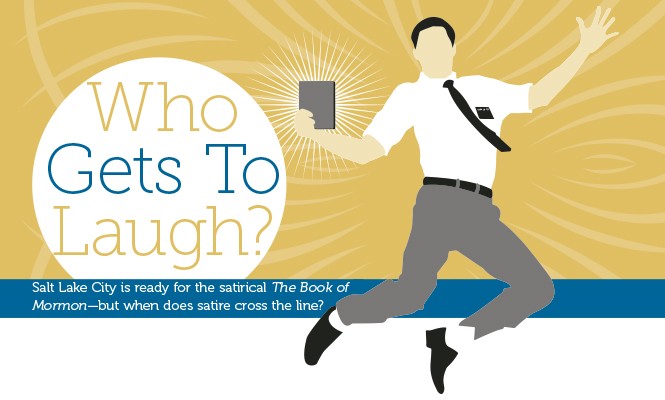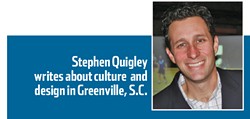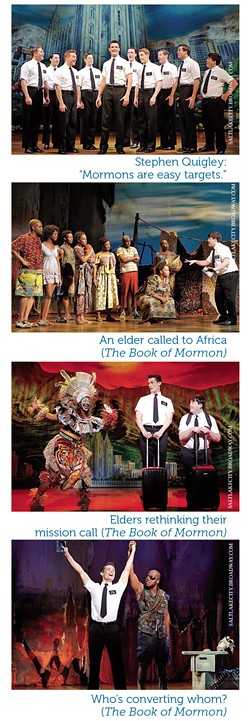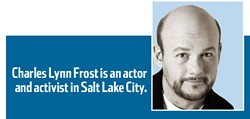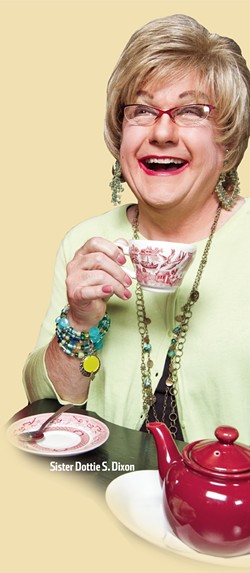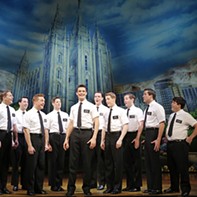Who Gets to Laugh?
Salt Lake City is ready for the satirical The Book of Mormon—but when does satire cross the line?
By City Weekly StaffOn July 28, the 2011 Tony Award-winning musical The Book of Mormon arrives at last in Salt Lake City for a two-week touring company run—and you'd better believe the locals were ready. Within minutes of tickets going on sale, website orders were backed up hundreds deep. If you don't have a ticket yet, you might need to pray for intervention from Heavenly Father.
The show has been popular and acclaimed enough that it's easy to understand a general eagerness to find out firsthand what all the shouting is about—but it also feels like we in Utah, no matter our religious affiliation, have a sense that this show somehow belongs more uniquely to us. Is a show that pokes fun of the predominant local faith something we're ready to laugh at even more than audiences in other places? And if so—why?
In a climate where it feels like humor is becoming ever more controversial, we celebrate the arrival of The Book of Mormon by asking who gets to make touchy jokes, and who gets to laugh. Freelance writer Stephen Quigley relates his experience seeing the show in conservative Christian-dominated South Carolina. Local actor Alexis Baigue talks about 15 years as a cast member in our own local satire that often targets Mormon foibles, Saturday's Voyeur. And actor Charles Frost—better known as proud Mormon mother Sister Dottie S. Dixon—tells his own unique story of first seeing The Book of Mormon in New York City.
As audiences get ready to enjoy the show, we look at how there's no easy or obvious response to satire, whether it's laughing out loud or thinking, "That's not funny." Comedy can be funny that way.
—Scott Renshaw
Arts & Entertainment editor
Mock of Ages
A non-Mormon from South Carolina reflects on the satire of religion and The Book of Mormon.
By Stephen Quigley
This summer, The Book of Mormon will finally be coming home (so to speak) to Salt Lake City's Capitol Theatre for a packed 16 shows in 13 days, starting July 28. To be clear, we're talking about the musical The Book of Mormon, not Joseph Smith's translation of the golden tablets. That Book of Mormon is, of course, revered by 15 million worldwide members of The Church of Jesus Christ of Latter-day Saints and the hundreds of thousands of Mormons belonging to other sects and splinter groups. No, this Book of Mormon is the Matt Stone and Trey Parker version—the creators of television's South Park.
The Salt Lake City showing, however, won't be the first time the musical has played in a town marked by religious fervor—the musical ran at the Peace Center in Greenville, S.C., in November 2014 for eight shows. The Greenville showing was significant because, while the Book of Mormon is largely a mockery of the LDS religion, it's also critical of religion in general. While not LDS, Greenville is the home of Bob Jones University, a bastion of fundamentalism—of the Christian kind. The reaction the play received in Greenville is noteworthy.
The musical has been hugely popular, spreading a kind of cross-cultural schadenfreude to cities where citizens don't even know anyone of the Mormon faith—and why should they, having endured a Mitt Romney presidential campaign? For Salt Lakers, Mormon or not, get your ticket, have a night out, but be prepared to squirm in your seat and lower your head so your neighbors don't see you laughing at what your conscience tells you is really wrong.
For one who is not of the LDS faith, there is much to mock. As Jon Krakauer writes in Under the Banner of Heaven, the LDS faith is the only major religion that formed during the time of the printing press. Because of this, we know of the many outrageous sexual exploits of its founder, the exploits of Brigham Young, and the religion's historically contradictory views and practices as regards race—and let's not forget the "magic" underwear. Again, it was the effect of the printing press that gave mankind more perspective on Smith and his followers. LDS leaders, in turn, had less control of their narrative. It is interesting to think, as Krakauer points out: What else would we know about Jesus, Buddha or Muhammad had they lived during this same age of pundits and paparazzi?
In our American pluralistic society, it is important to realize the relative nature of faith and the xenophobia that fundamentalism can manifest. While it is easy to mock the LDS faith as the musical does, it is equally important to consider that one's own faith can be just as easily mocked by another who does not share that belief. In fact, because our respective cultures tend to isolate us from others, we don't always know that there is someone out there in the world systematically mocking our own faith and its beliefs. This belittling humor is a culture's defense mechanism, designed to create divisions in humanity and solidify boundaries of power and influence.
Because faith cannot be reasoned—only believed or rejected—what makes one faith more "correct" than another? For a believer of any kind, it hypocritical to think that one has a right to laugh at another's beliefs. In this argument, the only people off the hook are the ones who believe in nothing.
By mocking a major religion—one that is not the playwrights' own, The Book of Mormon begs the ethical question of its audience: Who gets to laugh? This question is especially interesting in the context of Greenville, S.C., where we celebrate less diversity and—many would argue—more fundamentalism.
Would the average citizen of Greenville think it funny for non-Christians to laugh at the absolute truth of the Bible, the divinity of Christ or perhaps the Immaculate Conception? Having lived here, I can firmly say I don't think so. Would it be funny to mock the congregations of one of our many Baptist churches? What about Bob Jones University, whose own missionary network spans the globe? While there is enough comic fodder to send a production of B.J.U. to Broadway, we in Greenville won't be the ones to do it. Because in Greenville, we live among the people of Bob Jones. They are our neighbors. We do business with them. We who live in Greenville know Bob Jones alumni who transcend the Christian fundamentalist stereotypes with which we are all familiar. So for us, should mocking the LDS religion be any different?
Yet, when the musical came to Greenville, we did laugh. Sadly, we laughed at the obvious racism demonstrated when the lead African character, Nabulungi, played the fool by confusing a rusty old typewriter for a cell phone. Ironically enough, Africans, as a population, knew how to text long before Americans. For Stone and Parker, wouldn't it have been smarter to have cut this bit out, to make the Africans consistently wiser than the religious colonizers, as was portrayed in other scenes? We laughed generally with the kind of schadenfreude only attained through great ignorance, the result of a homogenous society lacking in counter-statement.
A few hit the exit doors right away, but for the most part, the audience in Greenville cheered this musical from start to finish. We even gave it a standing ovation so long and loud it was as if the audience believed the players would be inclined to do another scene as an encore. No, we didn't want to give up that triumphant moment; we didn't want to exit the theater doors to the natural light. We laughed, not realizing that Stone and Parker pulled no punches—that they were also mocking our religion and our town.
The Book of Mormon, many would argue, is obviously satire. Its purpose is to make audiences laugh. To mock. To let off steam. Who cares? But does satire work when the audience is ignorant? Is it satire at that point? Perhaps it is just sophomoric, in that Mormons are easy targets. Do I get to laugh when I don't actually know anyone who is LDS? And is it worse when I do laugh?
It is a testament to Mormons that they have tolerated this musical production in the manner they have. In a 2011 National Public Radio interview, Stone and Parker were asked how they thought LDS Church members would respond to their musical: "They're going to be cool," Stone said. "We weren't that surprised by the church's response. We had faith in them." Instead of protesting, the LDS Church took out ads in the musical's playbill stating, "You've seen the play, now read the book," and, "The book is always better." So, will there be Mormons rioting in the streets of Salt Lake City? I doubt it.
The satire will obviously hold a different meaning for the people in Salt Lake City than it did for the people in Greenville. In Greenville, we don't know Mormons, so it is especially easy—as hypocritical as that may be—to laugh. In Salt Lake City, however, the audience members—unlike others who have watched the show—may be Mormons, formerly Mormons, and have Mormon neighbors, colleagues and friends. It will be interesting to know who in the audience, in this community, will be laughing—and why. Perhaps this musical will offer the non-Mormon Salt Laker a sense of solace through the humor, a kind of signal from the outside world concurring that, yes, the Mormon faith is ridiculous, and we feel for you. Or this musical could act in another way: more like a wedge that drives the community—neighbor to neighbor—further apart.
View from a Voyeur
A conversation with longtime Saturday's Voyeur actor Alexis Baigue.
By Scott Renshaw
Actor Alexis Baigue is a cast member in Salt Lake Acting Company's annual musical satire Saturday's Voyeur, created by Allen Nevins and Nancy Borgenicht. He spoke with City Weekly about his 15-year history working on a show that—like The Book of Mormon—often makes the LDS faith a target for jokes.
City Weekly: Were you raised in the LDS Church yourself?
Alexis Baigue: For 19 years. When all of my peers were starting to leave for the mission field, that's when I was starting to go, "Look over there!" and ran away. At that point, I'd already lost my testimony ... and I'd realized I was gay, and that wasn't going away magically, despite all the praying and fasting. ... A year later, I was singing and dancing onstage in Saturday's Voyeur, while my peers were out sweating in the mission field.
CW: Do you recall your first experience watching Saturday's Voyeur before you were a cast member?
AB: It was 1995 ... about six months after I'd stopped going to church. I didn't really know anything about it, except that it was supposed to be funny, and I don't think I even really knew that it was about local culture and politics. ... It really, in a wonderful way, blew the top of my head off. It's an experience that I hear a lot of people describe when they come to Voyeur, especially their first time ... that it was such a unique catharsis. ... It took the significance out of things that had heretofore seemed so ... heavy, important and sacred. By singing and dancing about them in a light way, [the show] asked the question, "Well, is it really that significant?"
CW: Was there any specific joke that you can recall thinking, "Am I allowed to laugh at that?"
AB: It was Family Home Evening in Saturday's Voyeur, and Nevins and Borgenicht took the song "Sodomy," from Hair. And I think they just altered a few words. This young girl is going to present some lesson to the family, and she sings, basically, "Intercourse, ejaculate, contraception with a rubber—father, why do these words make us shudder?" or something like that. ... It seemed so inappropriate to show an adolescent girl singing these words that I wouldn't even use, except with my closest friends. ... That's the part that has burned itself onto my brain. And in a way—if we're talking about what's appropriate and what's not—why shouldn't an adolescent girl be asking questions about sexuality to her family? So in that way, it was horrifying and amazing and inappropriate and wonderful.
CW: Voyeur has often targeted not just the influence of the LDS Church in local politics, but the beliefs of the faith. What are your thoughts about jokes that are aimed not at the way the LDS Church manifests itself in public life, but at the beliefs themselves?
AB: I think that's a really great question, and one that I've asked, especially this year, where the show really is looking at belief and doctrine and ... the narrative of Joseph Smith that has been created and re-created and re-created. ... I think there is value in asking the question, including in a satirical way, "Should we really honor this belief?" ... We who want to be respectful of other people are often reluctant to risk being disrespectful of beliefs [or] ideology, because we don't want to hurt people who hold them as sacred. But we can respect people and still question even their beliefs—if not necessarily in conversation, certainly in the context of satire. OK, you think this belief is really sacred. Well, let's really look at it. Why? What really works about it, or what doesn't work about it? Should we really be honoring it? And I think that we can still honor anyone ... without necessarily honoring the thing that they believe, or the practice that they follow.
CW: Can you remember a time when you thought a Voyeur joke went too far?
AB: My experience with this play—with any text—is to make it as good as I possibly can. ... I feel like I'm an attorney, in that I may not agree with what my client has done, but I am here to argue my client's case. ... Regardless of what opinions I have about the content or the quality or anything, I have to take it and just try to make it as awesome as I can for the audience.
The only time I've really gone, "Ugh?" In 2012, at the end of the show, President Marriott or Elder Marriott, whatever he was called, ... the big Mormon muckety-muck representing the entire church hierarchy ... at the end of the show, he reveals himself to be the devil. And I was like, "Really? What are we saying, that any particular apostle, or all the apostles, or the whole church, they're the devil?" I mean, I wasn't, "Oh, that's too mean." It just seemed too simple.
CW: Do you feel like Voyeur can only work because it's produced in Utah—not just in terms of references that only locals would get, but are we "allowed" to make jokes that non-Utahns perhaps shouldn't get a pass at making?
AB: Maybe. I think there's no "true" answer to that. That's for the audience in those particular places to say. If someone comes to see Saturday's Voyeur or any show, and they think it's not funny, or just too harsh, too strident, they won't continue to buy that product. ... But from a social perspective, I do think it's a useful question. Whether it's Mormons in Utah vs. out of Utah, Muslims in Europe—yeah, where socially are we being responsible? Is it a good thing to attack the hierarchy or the beliefs, or is it irresponsible? And I don't know the answer to the question.
CW: A lot of comedians lately are pushing up against what you get to make a joke about. Should there be rules about who gets to make certain jokes?
AB: [pause] I don't know. [laughs]
CW: So, for example, do you feel more comfortable hearing a gay comedian tell a gay joke versus a straight comedian telling a gay joke?
AB: Yeah, I guess so. Yeah. But, it's rare that I have heard any comedian tell a gay joke that it was like, "Oh! They shouldn't! They don't understand what it's like!" The way I will throw around with my gay friends "fag" or "faggot," and if I heard a straight person say that, I would be like, "Wait, that's our N-word. You don't actually get to call me a fag." ... It's really on an individual basis. And I think there are plenty of people who are of the opinion that The Book of Mormon shouldn't be making those jokes, or Saturday's Voyeur shouldn't be making those jokes, and a lot of people who think they should, and we love it.
CW: Have you had friends or family talk to you about something they personally felt was offensive in a Voyeur production, and how did you respond?
AB: Most of the time, they don't. I wish they would more often. ... A year and a half ago, I was having a conversation with my mom about all kinds of serious topics [and] near the end, the topic of Voyeur came up. She said, "I just want you to know I'm not actually coming to see the show this summer." And I was surprised; she'd made it through 13 Voyeurs in which I'd acted. And I went, "What was the straw that broke the camel's back in your 13th Saturday's Voyeur?" And, of course, my mind is going to all the things in the show: "Oh, she's watching this guy get it on with a girl in a baptismal font."
Anyway, she said, "Well, it's when those two girls, at the end of the play, they were going to go on their missions. And then they just started kissing. Sister missionaries are not lesbians."
I found that very funny; it was just a silly, throwaway part of the show compared to things that I thought were legitimately too hard on her faith. But she was a sister missionary, and I think really valued the service that she did. ... She came to see the show that summer anyway.
CW: In a couple of recent Saturday's Voyeur productions, the show has used closeted gay men married to women as punch lines. How do you walk that line of not making people who are in some ways the victims become the butt of the jokes?
AB: Making fun of individuals who go along with what they're told—I like that we have taken on [both] the hierarchy and the individuals who follow through on it. ... It may be really shitty that the apostles are giving really harmful, hateful advice to their membership on how they should live their lives. But ultimately ... it's the individuals. So it is valuable to go, ... "Why are you taking their bullshit prescription? You are also worthy of some critique: you—a gay man marrying a woman—and also you—the woman. Come on, you have eyes in your head; everyone knows he's gay. You, too, are worthy of criticism. Yes, the situation you're stuck in is heartbreaking, but you've got to take responsibility."
CW: This year feels like Voyeur was more wide-ranging in its religious targets than previous years have been. Is that a better, worse or neutral development?
AB: For me, I don't feel like it really makes my job any easier or makes me any more comfortable, although you'd think that it would. I've been saying as long as I've been acting in this, that we're an equal-opportunity offender, ... and this year, there's a little more to back that up than usual. But even when the whole show or the scene is really just looking at what we're dealing with here in Utah, I don't have a problem with that. Because that is what I'm swimming in, I guess. I like it, though. I don't think it makes it any easier, but I do like it. It's like the writers have said, "It's all silly."
CW: It sometimes seems like the general defense for risky humor is that people vote with their laughs. How much should we be asking ourselves why we find something funny?
AB: That is how comedy, especially satire, works. There should be—often, if not all the time—some question about propriety on all sides: consumer, producer, etc. [But] if I'm not making the audience uncomfortable to some degree, at least some of the time, I don't think I'm doing my job. And that includes comedy. ... You're sort of doing a service by making people laugh, hopefully. And when I'm in the audience, I do look at whether it's responsible of me to laugh. We've often had the experience of laughing then [covers mouth] ... is it OK to laugh at this? That's when it's the best: When you're trying to hold something in, but something is happening despite your attempts to not let it happen. That's a really great indicator of what's actually happening: If they're laughing, and actually trying to repress the laughter, then there must be something really juicy in there.
Sublime Parody
Humor has the power to make us laugh—and to change the world.
By Charles “Sister Dottie S. Dixon” Frost
I am a smack-dab-in-the-middle Baby Boomer, born in 1954. Throughout the 1950s and through the 1980s, all I was ever exposed to had a Mormon tentacle attached to it.
Fast-forward to Sept. 15, 2011. I was married in New York City to my husband, Douglas, and saw The Book of Mormon for the first time that evening with 28 other people on my theater tour who had also been raised Mormon. There we sat in the Eugene O'Neill Theatre, dead center. Anticipation was high as everyone waited to see the show.
Curtain up: A giant panoramic backdrop complete with Dee's Family Restaurant, the Brigham Young statue, Eagle Gate and the Salt Lake Temple. Spooky that all my past Mormonism bubbles up, my heartbeat increases, and OMG yes, that old Mormon guilt floods my brain. I know way too much about what I am about to witness, and it makes me terribly nervous.
Metaphorically, I pinch myself. Am I really on Broadway watching musical theater—something most all gay men adore? Did I just get married to the man of my life sitting next to me? Is everyone giddy with the giggles/wiggles? Yes!
The backdrop flies up, and we hear the first chimes of "Hello"—among the greatest musical openers in any Broadway show. We are titillated, and off into an amazing theatrical experience—one we all relate to, parody at its finest.
Firstly, let's deal with definitions of parody: 1. a piece of writing, music, etc., that imitates the style of someone or something else in an amusing way; 2. a bad or unfair example of something.
Really, very seriously, it all comes down to being able to laugh—and laugh heartily—at oneself, and one's own background, beliefs and baggage. For me, The Book of Mormon is a brilliant example of the first definition of parody. However, if you can't quite get that Mormon stick pulled out, you will find the second definition making you squirm in your seat.
A few favorite highlights.
•The best romantic Broadway couple ever are elders Price and Cunningham. These two rival Tony and Maria.
•How daringly and adeptly the genius writers and composer—Trey Parker, Matt Stone and Robert Lopez—explore and expose such heavy themes as war, poverty, famine, female circumcision, dying of dysentery and AIDS—just to name a few—all while juxtaposed against the rigidity of the LDS religion, regimen and delusion, and with a plentitude of laughter.
•The hilarity of homosexuality, and how well it accents top-notch tap-dancing.
•All of Mormon repression brilliantly placed in one gigantic full cast number titled, "Turn It Off."
•The demonstration of testimony in the powerful Elder Price solo, "I Believe."
•The beautiful, hopeful and helpless ballad, "Sal Tlay Ka Siti," sung by the character Nabulungi, which leaves anyone with a heart shedding several tears.
Mark my words: The Book of Mormon will eventually become the longest-running, largest moneymaking, multi-award-winning musical in musical-theater history. This very fact pisses off the brethren in unspeakable ways. "That money's not coming home? What?" However, when I went back to see The Book of Mormon on Broadway in 2013, the LDS Church had taken out a full-color, two-page playbill centerfold advertisement that read, "You've seen the play ... now read the book." I still have not decided if that move was sheer marketing effulgence or dimwitted desperation.
As a theater professional myself who has had some fun with the LDS Church over the years—albeit from a different perspective, having dealt with acceptance and rejection of my creation Sister Dottie S. Dixon, the accidental activist Mormon mother of a gay son—I have had to develop chunky skin to navigate the opinionated waters of Utahns. The East Coast Mormons who indicated they "enjoyed" The Book of Mormon when it premiered on Broadway are very different Mormons than those living under the Zionic bubble.
One thing I am most positive about is this: Growth and comfort never co-exist. So go and enjoy, laugh and learn, listen and hear, feel and experience your humanity.
More by City Weekly Staff
-
THE ESSENTIAL A&E PICKS FOR APR 18 - 24
Ririe-Woodbury: Ascent, Tumbleweeds Film Festival, Look at Us: Portraits of Endangered Species, and more.
- Apr 17, 2024
-
MUSIC PICKS APR 18 - 24
INZO @ The Complex 4/19, Page Fish, Kaytlin Numbers @ Velour 4/19, Fuck Mike Lee Fest @ The Beehive 4/20, and more.
- Apr 17, 2024
-
MUSIC PICKS APR 11 - 17
Direct from Sweden - Music of ABBA @ Abravanel Hall 4/12-13, BYNX @ Soundwell 4/13, Talib Kweli @ Urban Lounge 4/15, and more.
- Apr 10, 2024
- More »
Latest in Cover Story
Readers also liked…
-
Forget the family pedigree—Robert F. Kennedy Jr should not be the next president of the United States
Trojan Horse
- Jun 21, 2023
-
Women decry harassment and toxic culture at St. George auto dealership
Men at Work
- Oct 11, 2023


